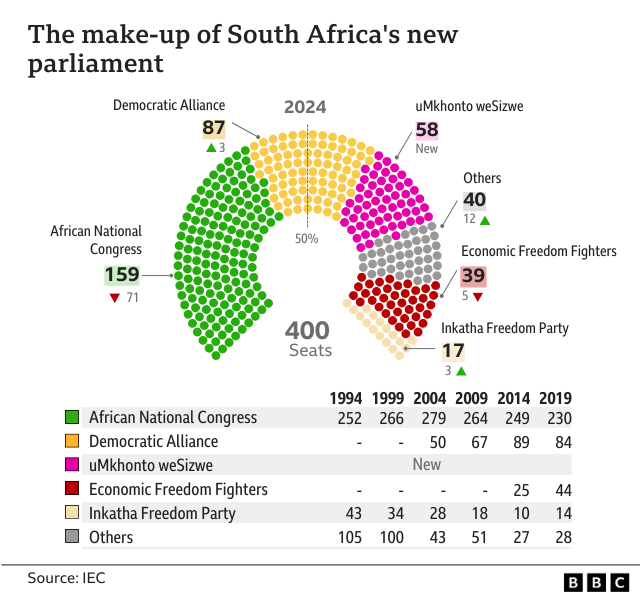

South Africa’s main opposition party, the Democratic Alliance (DA), says it has agreed a deal with the governing African National Congress (ANC) to form a government of national unity.
This comes after weeks of speculation about who the ANC would partner with after losing its parliamentary majority for the first time in 30 years, in last month’s elections.
It got 40% of the vote, while the DA came second with 22%.
This paves the way for ANC leader Cyril Ramaphosa to remain president.
An alliance between the centre-right DA and the ANC is unprecedented as the two parties have been rivals for decades.
DA leader John Steenhuisen said the deal was a “new chapter in our history”.
Mr Steenhuisen told journalists that in return for the DA’s support of Mr Ramaphosa, the ANC would back the DA’s Annelie Lotriet as deputy speaker of parliament.
The deal also includes the Inkatha Freedom Party (IFP), a conservative party with a strong Zulu base, which got 4% of the vote.
South African news website News24 says the agreement covers the division of posts in the government, as well as the provincial governments in Gauteng and KwaZulu-Natal.
Mr Steenhuisen said: “Through the votes the country has made it clear that they do not want one party to dominate our society.”
It is being billed as a Government of National Unity (GNU), but the ANC failed to get the third- and fourth-biggest parties – former President Jacob Zuma’s uMkhonto weSizwe (MK) party and Julius Malema’s Economic Freedom Fighters (EFF) – to join.
The coalition deal is likely to be welcomed by the business sector, who think it will guarantee economic stability and avoid capital flight as it does not include the EFF and MK, who advocate nationalisation of land, mines and banks.
MK had set the resignation of Mr Ramaphosa as one of the conditions for entering into a coalition, but the ANC rejected the demand.
Mr Malema on Thursday evening said the EFF had refused to join a government which included the DA, saying it was part of the “imperialist agenda”.
The ANC’s deal with the DA and IFP is seen as an attempt to promote racial and ethnic reconciliation following a bruising election campaign.
President Ramaphosa has previously accused the DA – which draws its support mainly from racial minorities – of being “treasonous” and “reactionary”.
This coalition government will mark a shift from the sharp racial and ideological divisions that have long marred the DA’s relationship with the ANC.
The ANC was deeply divided over a deal with the DA, with some of it senior leaders – backed up by their allies in the trade union movement and the South African Communist Party (SACP) – preferring a coalition with the EFF and smaller parties or MK.
But Mr Ramaphosa was said to prefer a coalition with the DA and IFP, seeing them as the most reliable partners to tackle South Africa’s economic crisis and deteriorating infrastructure.
While this is a significant step, Mr Steenhuisen acknowledged that South Africa’s problems, such as crime and economic issues, would not be “solved overnight” and that the “road ahead will be difficult”.


Go to BBCAfrica.com for more news from the African continent.
Follow us on Twitter @BBCAfrica, on Facebook at BBC Africa or on Instagram at bbcafrica
BBC Africa podcasts
EMEA Tribune is not involved in this news article, it is taken from our partners and or from the News Agencies. Copyright and Credit go to the News Agencies, email news@emeatribune.com Follow our WhatsApp verified Channel









